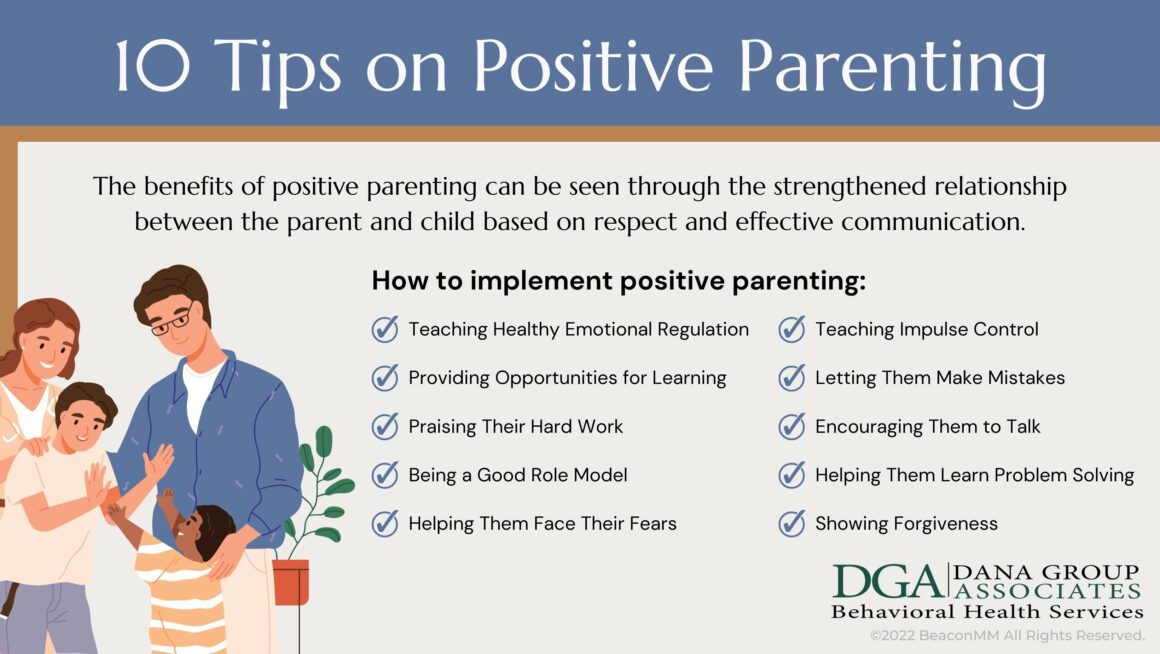Positive parenting and positive discipline focus on teaching good behavior in kids using a kind and firm approach. It’s a parenting principle that assumes children are born good and desire to do the right thing and need guidance on acting appropriately. It emphasizes the importance of mutual respect and a positive parent-child relationship.
This approach focuses on teaching proper conduct for future behavior instead of punishing past misbehavior. Many modern parents have taken to this gentle parenting approach to raising happy children in ways that reflect their family values and beliefs. The positive approach works when parents are sensitive to their children’s needs, developmental stages, and temperament.
The benefits of positive parenting can be seen through the strengthened relationship between the parent and child based on respect and effective communication. Your child can benefit from this parenting approach because they’ll have a strong bond with you, higher self-esteem and happiness, a positive role model example, and fewer bad behaviors.
The overall benefit is that it can set your child up for better success when they have been positively reinforced to do the right behaviors and know that you’re a person they can seek help from in times of need. But how do you implement positive parenting? Here’s a guide on ten tips for raising mentally strong kids through positive parenting.
Are you looking for a family counselor that can reconnect your family? Schedule your appointment with Dana Behavioral Health today!

1. Teaching Healthy Emotional Regulation
A positive parenting technique is to teach healthy emotional regulation and positive coping skills. It’s important to teach your children these beneficial techniques as it will help them better understand their emotions and how to deal with them in a manner that avoids negative consequences.
You can implement this technique by asking your child what they feel and why. You should validate their emotions, explaining that it’s not bad to feel a certain way — whether happy, mad, or sad. Then you can address how to properly react when they’re feeling that way and why it’s important to behave that way. This will establish a positive coping skill that allows them to process their emotions and then consider appropriate behaviors to handle the situation.
2. Providing Opportunities for Learning
Positive parenting includes providing your children with plenty of opportunities to learn new things. Allowing these chances of exploration enables children to learn how to get through experiences that may be challenging. But allowing them to struggle and work hard to succeed at something will boost their confidence and self-esteem.
It may be hard to watch them work through problems, but they’ll learn problem-solving skills to help them in other areas of their lives. They can use those problem-solving skills to help them through school and work through difficult emotions. When providing learning opportunities, ensure that you answer their questions in age-appropriate ways that foster their drive to learn and understand the world.
3. Praising Their Hard Work
A positive approach includes praising their hard work and avoiding harsh criticism. You can reward their successes and positive behaviors, but it’s important not to lash out when they misbehave. If there is a serious negative reaction to them trying to learn how to do the right thing, it will hurt the parent-child relationship.
Appropriately reinforcing their good behaviors will enable them to do the right thing again in the future. It also reinforces the bond between you and your child.
4. Being a Good Role Model
Your kids look up to you, making your actions crucial to what they’re learning about the world. They learn how to behave by watching what you do. Being a good role model will show them how to behave appropriately and know what is okay and not okay to do.
Be real and vulnerable with your children. You don’t have to hide your struggles or act like nothing ever goes wrong. Show them that challenges are normal, okay, and surmountable.
5. Helping Them Face Their Fears
Having fears is deeply engrained in us. And many times, fear can be crippling and enable people to avoid certain experiences that may be good for them. While reaching a place of contentedness is great, teaching them to face their fears enables them to challenge themselves to get better.
You should validate their fears and address that feeling anxiety and fear is okay. Talk with them about their fear (even if it seems silly to you) and make a plan on how to approach that fear in steps. It allows them to learn that conquering fears can be a good thing and will make them feel empowered to do so in the future because they’ve accomplished it before.
Are you searching for family counseling? Schedule an appointment today!
6. Teaching Impulse Control
Having impulses is a normal experience; however, not every impulse is the right thing to follow through. Teaching them self-discipline and the benefits of delayed gratification will help them battle temptations and push through even when they feel like giving up. You’ll teach them to always work towards doing better and allow them to know that they’re capable of pushing through.
Teaching your children early on will help establish a habit for life. They’ll learn to keep pushing forward on goals they’re working towards and use this habit in areas of their life such as their finances.
7. Letting Them Make Mistakes
Although positive parenting is about reinforcing their good behaviors and avoiding harsh criticism when they do something wrong, it doesn’t mean that you shouldn’t let them make mistakes. It can be difficult letting them make mistakes as they’ll typically get emotionally or physically hurt. However, letting them learn from their mistakes is crucial.
This will show that making mistakes is a normal part of life and that it’s okay to do so as long as they learn from their mistakes and make amends if they’ve hurt someone else. You should do this safely, allowing them to make mistakes but doing so in an area where you’re there to help if something goes wrong. They’ll learn from their mistakes but have helpful resources to help them through them.
8. Encouraging Them to Talk
One of the best practices of positive parenting is encouraging your kids to talk with you about their emotions, the good and the bad. Being emotionally available to process tough things is crucial for them to learn how to deal with their emotions healthily.
When you should your children you are available for them to talk about their emotions, that allows a safe space for them to process what they’re feeling and come to you when they need help. It teaches them that it’s okay to have the emotions they’re feeling and ways to address what they should do to solve the problem.
9. Helping Them Learn Problem Solving
Similar to letting children make mistakes, helping them learn how to problem-solve will be crucial to their development. There are a few ways that you can help them learn problem-solving skills, which can be adjusted to the situation and age of your child. For example, if they’re young and having a hard time with something, you can show them how to do it correctly.
Then as they get older, when they ask for your help, you can have them think through the problem before guiding them through it. Using open-ended questions will allow them to develop the solutions themselves and properly learn problem-solving skills. Aiding them in their problems will allow them to feel empowered to solve their issues and know it’s okay to ask for help.
10. Showing Forgiveness
Forgiveness can be a difficult emotion to accomplish for kids and adults. However, showing your children early on that they should take responsibility for their mistakes or bad behavior and then providing them with forgiveness will help them learn how their actions affect others. Your forgiveness allows them to forgive themselves for their mistake and learn from them.
You can show forgiveness by understanding their view and letting them know they are still valued and loved despite their mistake. This can strengthen your bond and allow them to learn how forgiveness is a powerful emotion that can sometimes be crucial.
How Can You Get Help Implementing Positive Parenting?
Knowing what positive parenting tools to use can be easy, but implementing them can be difficult. Understandably, sometimes it can be challenging to parent positively when your child has misbehaved. But the benefits of positive parenting will help you and your child when you practice it.
If you’re unsure where to start or implement the change, you can get support through behavioral health therapy. It’s a great way to change habits or behaviors healthily through the guidance of a therapist.
At Dana Behavioral Health, we offer family therapy that works towards helping your family be bonded and live happily. You can seek help from this great support system to learn more about positive parenting and teach your children that seeking help is okay. You’re showing them that their mental health is important and something that can be worked at.
If problems arise and have hurt your relationship somehow, you can seek counseling to help reconnect and move on healthily. Our goal is to support parents as they explore different parenting techniques that promote behavioral health.
Are you ready to get help with positive parenting techniques? Schedule an appointment with Dana Behavioral Health today!
